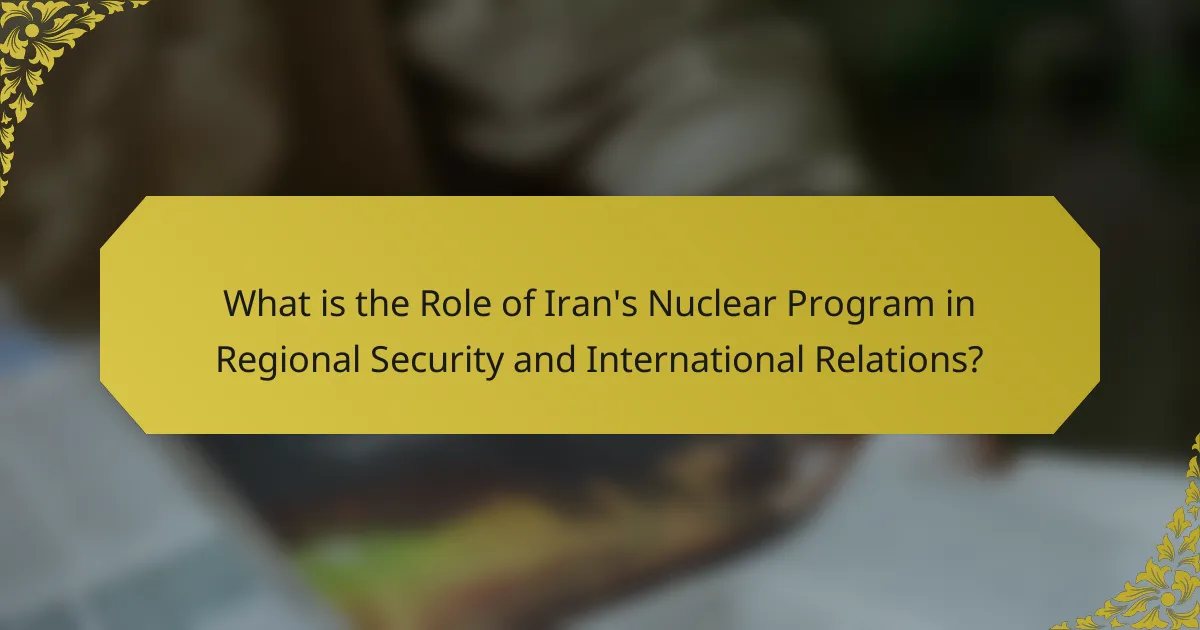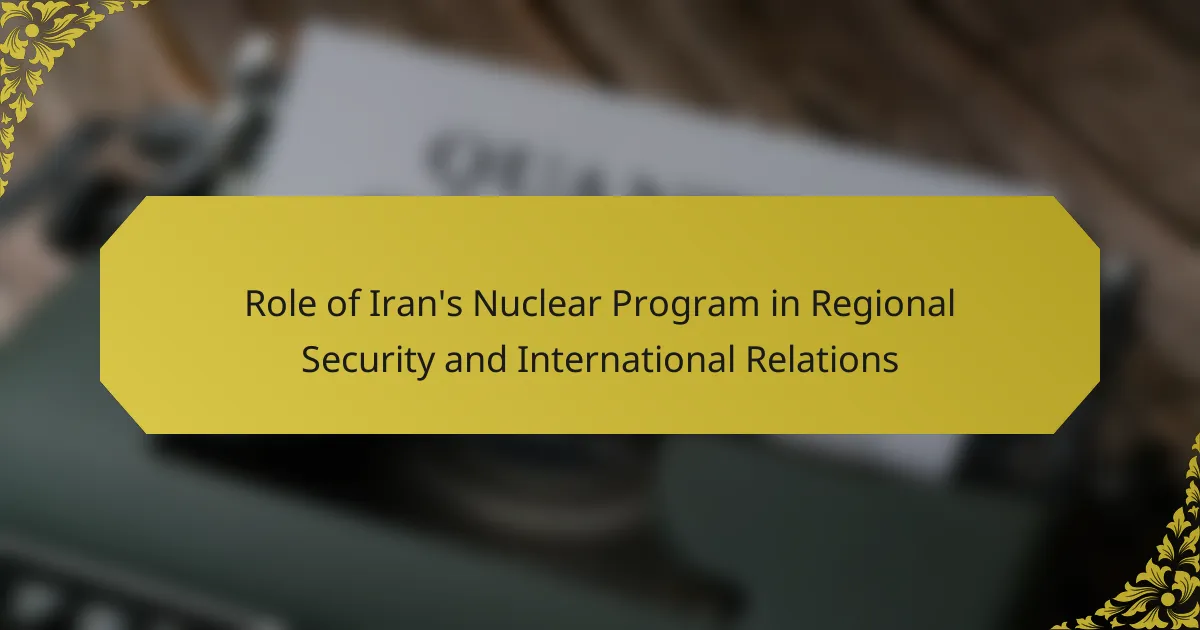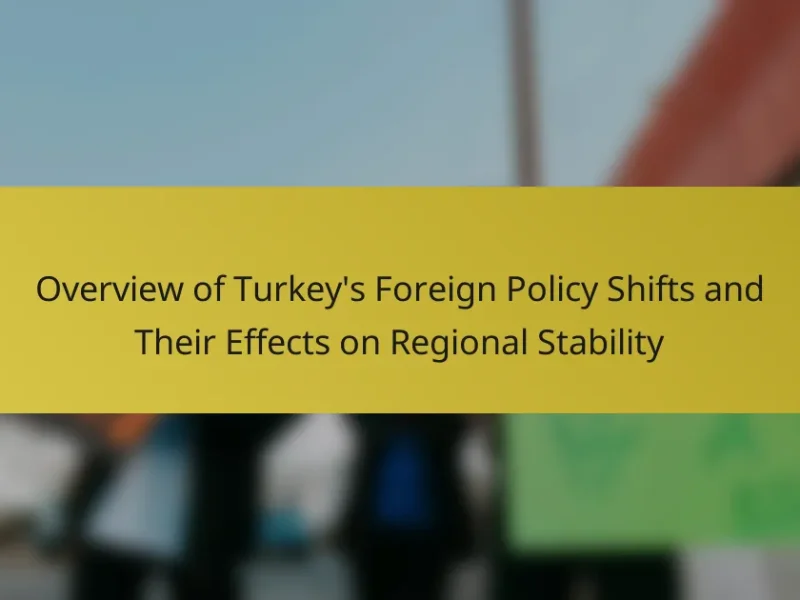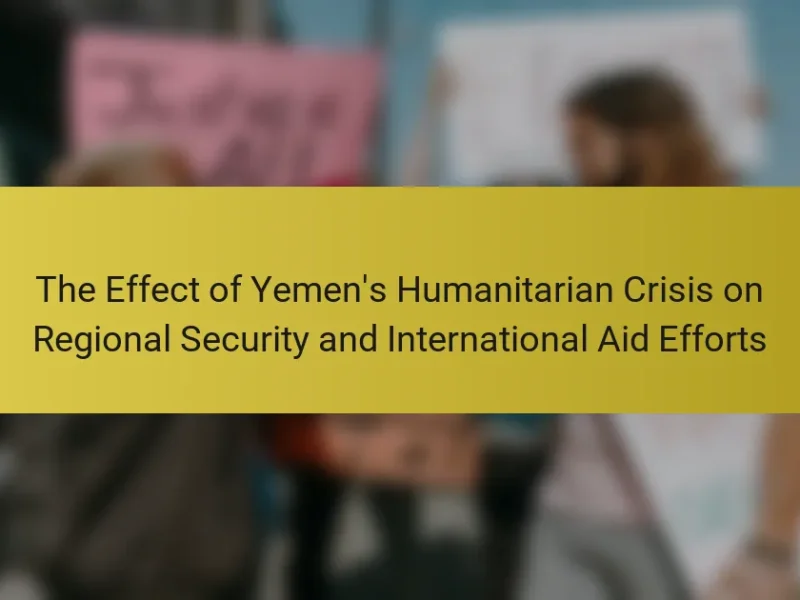
What is the Role of Iran’s Nuclear Program in Regional Security and International Relations?
Iran’s nuclear program plays a significant role in regional security and international relations. The program is perceived by neighboring countries as a potential threat. This perception influences military strategies and alliances in the Middle East. Countries like Saudi Arabia and Israel have expressed concerns over Iran’s nuclear ambitions. They fear a nuclear-armed Iran could shift the balance of power. The United States and other world powers have engaged in negotiations with Iran to limit its nuclear capabilities. The Joint Comprehensive Plan of Action (JCPOA) aimed to curb Iran’s nuclear program in exchange for sanctions relief. However, the U.S. withdrawal from the JCPOA in 2018 heightened tensions. Ongoing disputes over Iran’s nuclear activities continue to affect diplomatic relations globally.
How has Iran’s Nuclear Program evolved over time?
Iran’s Nuclear Program has evolved significantly since its inception in the 1950s. Initially, it was focused on peaceful nuclear energy development with assistance from the United States. The 1979 Iranian Revolution shifted the program’s trajectory towards secrecy and military ambitions. In the early 2000s, Iran faced international scrutiny over its nuclear activities, leading to negotiations and sanctions. The 2015 Joint Comprehensive Plan of Action (JCPOA) aimed to limit Iran’s nuclear capabilities in exchange for sanction relief. However, the U.S. withdrawal from the agreement in 2018 escalated tensions and led to Iran resuming certain nuclear activities. As of 2023, Iran’s nuclear advancements, including uranium enrichment, have raised concerns among regional and global powers. The evolution reflects a complex interplay of domestic politics, international diplomacy, and security considerations.
What key events have shaped the development of Iran’s Nuclear Program?
The development of Iran’s Nuclear Program has been shaped by several key events. The 1979 Iranian Revolution marked the beginning of a shift in nuclear policy. In the 1980s, Iran pursued nuclear technology primarily for energy needs. The 1994 agreement with Russia to complete the Bushehr nuclear power plant was significant. In 2002, the revelation of secret nuclear facilities at Natanz and Arak raised international concerns. The 2006 imposition of UN sanctions highlighted global apprehension over Iran’s nuclear ambitions. The 2015 Joint Comprehensive Plan of Action (JCPOA) aimed to limit Iran’s nuclear program in exchange for sanction relief. The U.S. withdrawal from the JCPOA in 2018 led to increased tensions and escalated nuclear activities. Each of these events has played a crucial role in shaping Iran’s approach to nuclear development and its impact on regional security.
How do international agreements impact Iran’s Nuclear Program?
International agreements significantly affect Iran’s Nuclear Program by establishing restrictions and frameworks for its development. The Joint Comprehensive Plan of Action (JCPOA) is a key example. This agreement, reached in 2015, imposed limits on Iran’s uranium enrichment and nuclear activities. In exchange, Iran received relief from economic sanctions. Compliance with the JCPOA was monitored by the International Atomic Energy Agency (IAEA). When the U.S. withdrew from the agreement in 2018, Iran resumed certain nuclear activities. This escalation heightened tensions in the region. Thus, international agreements play a crucial role in shaping Iran’s nuclear ambitions and its relations with other countries.
Why is Iran’s Nuclear Program significant for regional security?
Iran’s Nuclear Program is significant for regional security due to its potential to alter power dynamics. The program raises concerns among neighboring countries about nuclear proliferation. Countries like Saudi Arabia and Israel view Iran’s nuclear capabilities as a direct threat. This perception can lead to an arms race in the Middle East. Furthermore, Iran’s pursuit of nuclear technology has implications for U.S. foreign policy in the region. The 2015 Joint Comprehensive Plan of Action aimed to limit Iran’s nuclear activities but faced challenges. Ongoing tensions can destabilize the region and impact global energy markets. The program’s significance lies in its ability to influence both regional alliances and security strategies.
What are the perceived threats associated with Iran’s Nuclear Program?
The perceived threats associated with Iran’s Nuclear Program include regional instability and nuclear proliferation. Many nations fear that Iran’s nuclear capabilities could lead to a nuclear arms race in the Middle East. Countries like Saudi Arabia and Turkey may seek their own nuclear programs in response. Additionally, Iran’s history of supporting militant groups raises concerns about nuclear technology falling into the wrong hands. The potential for Iran to develop nuclear weapons poses a direct threat to Israel and other neighboring countries. International tensions have escalated due to these fears, leading to sanctions and diplomatic efforts to curb Iran’s nuclear ambitions. The 2015 Joint Comprehensive Plan of Action aimed to limit Iran’s nuclear program but has faced challenges since the U.S. withdrawal in 2018. These factors contribute to the overall perception of threat surrounding Iran’s nuclear activities.
How does Iran’s Nuclear Program influence the security dynamics of neighboring countries?
Iran’s Nuclear Program significantly influences the security dynamics of neighboring countries by heightening regional tensions. The program raises concerns among countries like Saudi Arabia and Israel, prompting them to reconsider their own defense strategies. For instance, Saudi Arabia has expressed interest in developing its own nuclear capabilities in response to Iran’s advancements. Additionally, the program impacts U.S. foreign policy in the region, leading to increased military presence and support for allies. Countries may also strengthen alliances or engage in arms races as a direct consequence of Iran’s nuclear ambitions. This dynamic creates a precarious security environment, where the potential for conflict escalates. Historical events, such as the 2015 Iran nuclear deal, demonstrate the global implications of Iran’s nuclear activities on regional stability.
What role does Iran’s Nuclear Program play in international relations?
Iran’s Nuclear Program significantly influences international relations by heightening tensions and prompting diplomatic negotiations. The program raises concerns among Western nations regarding nuclear proliferation and regional stability. In 2015, the Joint Comprehensive Plan of Action (JCPOA) was established to limit Iran’s nuclear activities in exchange for sanctions relief. However, the U.S. withdrawal from the JCPOA in 2018 escalated tensions, leading to increased sanctions and military posturing. Iran’s advancements in nuclear technology have sparked fears of a potential arms race in the Middle East. Countries like Israel and Saudi Arabia perceive Iran’s capabilities as a direct threat to their security. The program also affects Iran’s relationships with other nations, influencing alliances and geopolitical strategies. Overall, Iran’s Nuclear Program serves as a focal point for both conflict and negotiation in international relations.
How do major global powers view Iran’s Nuclear Program?
Major global powers view Iran’s Nuclear Program with significant concern. The United States perceives it as a threat to regional and global security. This perspective is rooted in fears of nuclear proliferation. European nations express a mix of caution and diplomacy. They advocate for negotiations to ensure Iran’s compliance with international agreements. Russia and China adopt a more supportive stance towards Iran. They emphasize the country’s right to peaceful nuclear energy. However, they also call for adherence to non-proliferation norms. The differing views reflect broader geopolitical interests and alliances.
What diplomatic strategies have been employed regarding Iran’s Nuclear Program?
Diplomatic strategies regarding Iran’s Nuclear Program have included negotiations, sanctions, and multilateral talks. The Joint Comprehensive Plan of Action (JCPOA) was a significant agreement reached in 2015. It aimed to limit Iran’s nuclear capabilities in exchange for sanctions relief. The United States, European Union, and other nations were involved in this negotiation process. Sanctions have been imposed to pressure Iran into compliance. These sanctions targeted Iran’s economy and key sectors like oil and banking. Diplomatic engagement has also included discussions through the P5+1 group, which consists of the five permanent UN Security Council members plus Germany. Ongoing dialogues and periodic reviews have been essential in addressing concerns related to nuclear proliferation.
How does Iran’s Nuclear Program affect its relationships with regional allies?
Iran’s Nuclear Program significantly influences its relationships with regional allies. The program fosters strategic partnerships with countries like Syria and Hezbollah, who view Iran as a counterbalance to Western influence. These allies benefit from Iran’s military and financial support, which strengthens their positions in regional conflicts. Conversely, Iran’s nuclear ambitions create tension with Gulf states, particularly Saudi Arabia and the UAE, who fear a nuclear-armed Iran. This concern leads to increased defense spending and military cooperation among these nations. Furthermore, Iran’s pursuit of nuclear capabilities complicates its diplomatic ties with allies who prioritize stability, such as Iraq, where balancing relations with both Iran and the West is crucial. Overall, Iran’s Nuclear Program shapes a complex web of alliances and rivalries in the region.
What are the implications of Iran’s Nuclear Program for its alliances in the Middle East?
Iran’s Nuclear Program impacts its alliances in the Middle East significantly. The program creates tensions with Sunni-majority countries, particularly Saudi Arabia. These nations perceive a nuclear-capable Iran as a direct threat to their security. Consequently, they may strengthen their military capabilities in response. Iran’s nuclear ambitions also drive Israel to enhance its defense posture. Israel views Iran’s nuclear development as an existential threat. Additionally, Iran’s program can solidify its ties with non-Arab allies, such as Hezbollah in Lebanon. These alliances may deepen as Iran seeks regional influence. Overall, Iran’s nuclear aspirations reshape the geopolitical landscape in the Middle East.
How do regional powers respond to Iran’s Nuclear ambitions?
Regional powers respond to Iran’s nuclear ambitions with a mix of diplomatic efforts, military preparedness, and strategic alliances. Countries like Saudi Arabia and Israel express significant concern over Iran’s potential nuclear capabilities. They fear a shift in the regional balance of power. In response, Saudi Arabia has signaled intentions to develop its own nuclear program as a counterbalance. Israel has conducted military exercises to prepare for potential strikes on Iranian nuclear facilities. Additionally, regional powers engage in diplomatic efforts to rally international support against Iran. They promote sanctions and advocate for stringent oversight of Iran’s nuclear activities. The United States’ withdrawal from the Iran nuclear deal in 2018 further heightened regional tensions. Overall, regional powers adopt a multifaceted approach to address the perceived threats posed by Iran’s nuclear ambitions.
What challenges does Iran face regarding its Nuclear Program?
Iran faces significant challenges regarding its nuclear program. International sanctions limit its ability to acquire technology and materials. The Joint Comprehensive Plan of Action (JCPOA) has faced setbacks, leading to increased tensions. Domestic political factions often disagree on nuclear policy direction. Regional adversaries express concerns over potential nuclear capabilities. The International Atomic Energy Agency (IAEA) monitors Iran’s activities, complicating its diplomatic relations. Additionally, public opinion varies within Iran about the nuclear program’s benefits and risks. These factors collectively impact Iran’s nuclear ambitions and international standing.
What internal and external pressures affect the sustainability of Iran’s Nuclear Program?
Internal pressures affecting the sustainability of Iran’s Nuclear Program include political factions, economic challenges, and public opinion. The Iranian government faces internal divisions regarding the nuclear strategy. Economic sanctions have led to financial strain, impacting program funding. Public sentiment fluctuates between support and skepticism about nuclear ambitions.
External pressures include international sanctions, diplomatic isolation, and regional security dynamics. The United States and allies impose sanctions aimed at curtailing nuclear development. Diplomatic efforts, such as the Joint Comprehensive Plan of Action (JCPOA), seek to limit Iran’s nuclear activities. Regional tensions with countries like Israel and Saudi Arabia further complicate Iran’s position.
These internal and external factors create a complex environment that influences the sustainability of the nuclear program.
How do sanctions impact Iran’s Nuclear Program and its broader goals?
Sanctions significantly hinder Iran’s nuclear program and its broader geopolitical ambitions. These restrictions limit Iran’s access to critical technologies and materials needed for nuclear development. As a result, Iran faces challenges in advancing its nuclear capabilities. Economic sanctions also restrict funding for the program, impacting research and development. For instance, the Joint Comprehensive Plan of Action (JCPOA) aimed to curb Iran’s nuclear activities in exchange for sanction relief. When the U.S. withdrew from the JCPOA in 2018, Iran resumed some nuclear activities, indicating the program’s resilience despite sanctions. However, the economic strain from sanctions has also led to domestic unrest, affecting Iran’s political stability and ability to project power regionally. Overall, sanctions create a complex interplay between Iran’s nuclear ambitions and its broader strategic goals in the Middle East.
What are the potential future scenarios for Iran’s Nuclear Program?
Iran’s nuclear program may lead to several potential future scenarios. One scenario is a continuation of diplomatic negotiations, resulting in a renewed nuclear agreement. This could stabilize relations with Western nations and reduce regional tensions. Another scenario involves Iran advancing its nuclear capabilities, potentially leading to a nuclear weapon. This would heighten security concerns among neighboring countries and the international community. Additionally, there is a possibility of increased sanctions from the U.S. and allies if Iran does not comply with international regulations. This could further isolate Iran economically and politically. Regional powers may also respond by enhancing their own military capabilities, leading to an arms race in the Middle East. Each of these scenarios carries significant implications for regional security and international relations.
How might changes in U.S. foreign policy influence Iran’s Nuclear Program?
Changes in U.S. foreign policy can significantly influence Iran’s Nuclear Program. A shift towards diplomatic engagement may lead to negotiations that limit Iran’s nuclear activities. Conversely, a more confrontational approach could prompt Iran to accelerate its nuclear development. Historical context shows that the 2015 Iran nuclear deal resulted from diplomatic efforts, leading to reduced uranium enrichment. In contrast, the U.S. withdrawal from the agreement in 2018 resulted in Iran resuming higher levels of enrichment. Additionally, sanctions imposed by the U.S. can strain Iran’s economy, impacting its nuclear ambitions. Thus, U.S. foreign policy decisions directly affect Iran’s strategic choices regarding its nuclear program.
What role could regional coalitions play in shaping the future of Iran’s Nuclear ambitions?
Regional coalitions could significantly influence Iran’s nuclear ambitions through diplomatic pressure and collective security agreements. These coalitions can unite countries with shared interests in preventing nuclear proliferation. For instance, regional powers may leverage economic sanctions or incentives to alter Iran’s nuclear policies. Collaborative intelligence sharing among coalition members can enhance monitoring efforts. Furthermore, joint military exercises can serve as a deterrent against aggressive nuclear posturing. Historical cases, such as the Arab League’s stance on nuclear weapons, illustrate the potential effectiveness of regional coalitions. Ultimately, a united front can create a more robust framework for negotiations and accountability regarding Iran’s nuclear activities.
What strategies can be employed to address concerns about Iran’s Nuclear Program?
Diplomatic negotiations can be employed to address concerns about Iran’s Nuclear Program. Engaging in dialogue with Iran can lead to agreements that limit nuclear development. The Joint Comprehensive Plan of Action (JCPOA) is an example of such an agreement. This deal, established in 2015, aimed to restrict Iran’s nuclear activities in exchange for sanctions relief. Regular inspections by the International Atomic Energy Agency (IAEA) can ensure compliance with nuclear agreements. Additionally, multilateral discussions involving regional powers can foster a collaborative approach. Economic incentives may encourage Iran to adhere to non-proliferation commitments. Finally, establishing a regional security framework can address broader security concerns linked to Iran’s nuclear ambitions.
How can diplomatic efforts be strengthened to manage Iran’s Nuclear Program?
Diplomatic efforts can be strengthened to manage Iran’s Nuclear Program through multilateral negotiations. Engaging multiple nations, including regional powers, fosters a comprehensive approach. Regular dialogue can build trust and transparency. Establishing clear frameworks for monitoring compliance is essential. Incentives for Iran to limit its nuclear ambitions can be offered. A combination of sanctions and diplomatic engagement may encourage cooperation. Historical agreements, such as the Joint Comprehensive Plan of Action (JCPOA), provide a model for future negotiations. Continued involvement from international organizations can ensure accountability and oversight.
What best practices can be adopted to enhance regional security in light of Iran’s Nuclear developments?
Enhancing regional security in light of Iran’s nuclear developments requires a multifaceted approach. First, diplomatic engagement with Iran is essential. This can include negotiations aimed at limiting nuclear capabilities. Such negotiations have previously led to agreements like the Joint Comprehensive Plan of Action (JCPOA). Second, strengthening alliances among regional partners can create a united front. Collaborative defense initiatives can deter aggression and foster stability. Third, implementing robust intelligence sharing among nations can enhance situational awareness. This allows for timely responses to potential threats. Fourth, promoting economic sanctions can pressure Iran to comply with international norms. Historical instances show that sanctions can impact a nation’s decision-making. Lastly, supporting non-proliferation initiatives can help prevent the spread of nuclear weapons. Organizations like the International Atomic Energy Agency (IAEA) play a crucial role in monitoring compliance. These practices collectively contribute to a more secure regional environment amidst Iran’s nuclear developments.
The main entity of this article is Iran’s Nuclear Program, which significantly impacts regional security and international relations. The article explores the evolution of the program, key events shaping its development, and the perceived threats it poses to neighboring countries, particularly in the context of military strategies and alliances. It discusses the role of international agreements, such as the Joint Comprehensive Plan of Action (JCPOA), in influencing Iran’s nuclear ambitions and the responses from regional powers. Additionally, the article examines the challenges Iran faces regarding its nuclear program, the implications for its relationships with allies, and potential future scenarios influenced by changes in U.S. foreign policy and regional coalitions.


